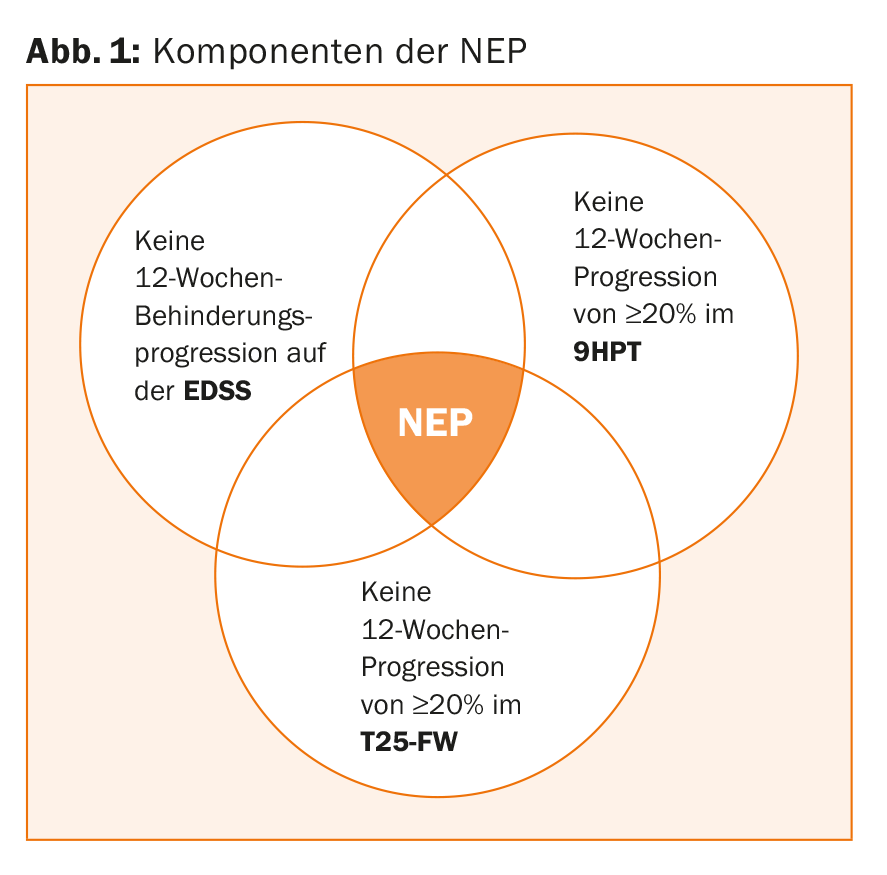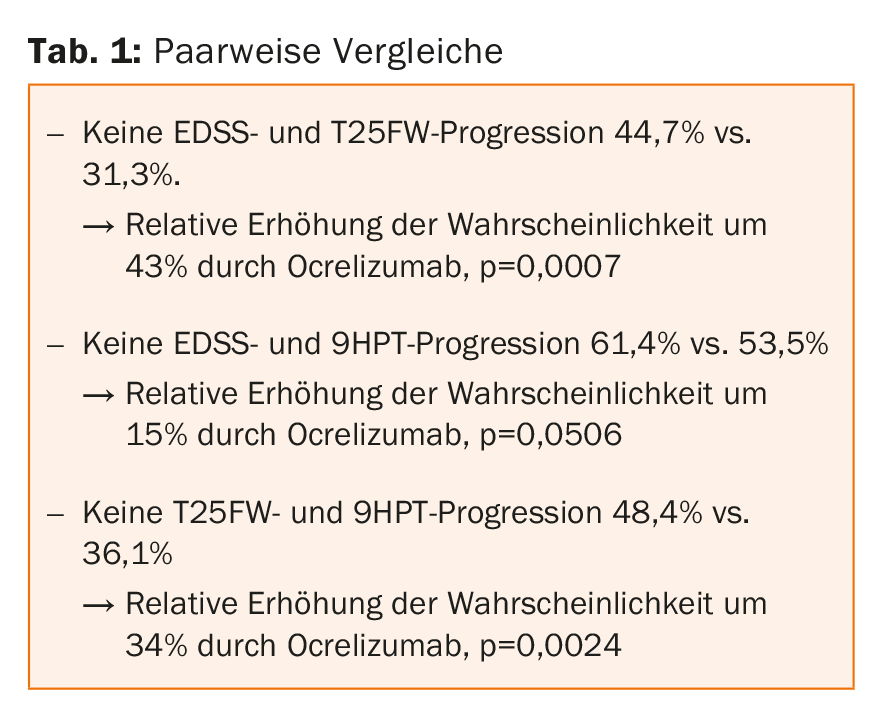At the ACTRIMS Forum 2017, B-cell depletion and thus the recently published results from the ORATORIO study in the New England Journal of Medicine were also on everyone’s lips. Not least because the approval process in the USA is currently in full swing. The task now is to classify the data and examine their clinical relevance. At the congress, some interesting findings on this were revisited. Where will the new antibody – and thus the first B cell-directed therapy in MS – fit into the therapeutic spectrum?
Even at past ECTRIMS conferences, it was hard to avoid the topic of B-cell depletion in MS, so prominently was it discussed. Meanwhile, ORATORIO, a phase III trial testing the antibody ocrelizumab in primary progressive multiple sclerosis (MS), has been published in NEJM [1]. In this study, the antibody, which selectively and specifically targets CD20-positive B cells, showed a significant risk reduction of 24% (32.9% vs. 39.3%) in secondary endpoints such as progression over a 24-week period, a significant risk reduction of 25% (29.6% vs. 35.7%), less deterioration in the 25-foot timed walk (T25-FW) of 38.9% at 120 weeks (vs. 55.1% with placebo), and less decrease in brain volume.
Tolerance was found to be preliminarily good, as in parallel studies in relapsing-remitting patients. More infusion-associated reactions, upper respiratory tract infections, and oral herpes occurred with the intravenously administered antibody, but no clinically significant differences were found in the rates of serious adverse events and infections. Tumors were found in 2.3% (ocrelizumab) and 0.8% (placebo) of participants.
Classification of the results
It was also agreed at the ACTRIMS Forum 2017 that the results are particularly relevant for patients with primary progressive MS, as the CD20 antibody is the first substance that was able to slow down this form of MS in a phase III trial. Primary progressive MS is characterized by steady disability accumulation from disease onset (with/without temporary plateaus in progression). Therefore, slowing down the progressive disability is an important therapeutic goal here, which has hardly been achieved in clinical trials so far [2–4]. Ocrelizumab is now expected to change this. In addition, the compound is being investigated in two other phase III trials in relapsing-remitting MS (OPERA) [5], where a significantly more favorable effect was achieved than with high-dose interferon treatment. Now it is a matter of waiting for the long-term data, which will be relevant in terms of both efficacy and safety.
The real novelty of ocrelizumab is the therapeutic approach. Instead of targeting the T cells responsible for attacking the myelin sheaths of nerves in the central nervous system, as most MS drugs do, the antibody binds to CD20 surface proteins expressed on certain B cells (more specifically, B progenitor cells up to the plasmablast stage, but neither B stem/pro B cells nor plasma cells, thus preserving important immune system functions).
The role of B cells has long been underestimated in research. However, B cells that infiltrate the CNS have the potential to fundamentally impact the pathophysiology of MS through several mechanisms. Their functions include cytokine and autoantibody production as well as antigen presentation/costimulation – all of which could contribute directly or indirectly to myelin sheath/axon damage and thus disability in MS patients.
The push to develop ocrelizumab was preceded by the discovery that rituximab, which also selectively destroys B cells, can achieve surprising results in MS. Even in the primary progressive form, which has so far been difficult to treat effectively, a slowing of progression is achieved – at least in younger patients and those with gadolinium-enriched lesions [3]. The development of a newer, this time fully humanized anti-CD20 antibody (rituximab is a mouse/human chimeric antibody) promises better tolerability. The decision not to invest further in the “old representative” rituximab, but to promote ocrelizumab in its place, is of course also likely to be related to the expiry of patent protection for rituximab.
Consistent with the results for rituximab, participants in the ORATORIO trial were younger or younger. had MS for less than 10 or 15 years (depending on the degree of disability). The population was thus “enriched”, as one would say in English, which may have additionally favored the positive results. Whether this selection is reflected in the approval text remains to be seen. What is clear is that ocrelizumab is a potent agent – most evident in its anti-inflammatory activity.
NEP – a clinically relevant endpoint
Now, in a further analysis on the ORATORIO trial presented at the 2017 ACTRIMS Forum, researchers asked to what extent disability progression is reflected in the so-called “no evidence of progression” (NEP) in reverse. NEP is a clinically relevant composite endpoint that includes other important measures of disability in addition to EDSS, namely the so-called Nine-Hole Peg Test (9HPT) and the T25-FW. These provide information on whether the disease has actually stabilized clinically. The 9HPT tests how long it takes the patient to place nine pins in designated holes and then remove them. This test provides good sensitivity to survey manual dexterity in MS patients. In T25-FW, the patient is asked to walk 25 feet as quickly and safely as possible. The time is stopped in the process. Specifically, the NEP endpoint (Fig. 1) required:
- No disability progression on the EDSS
- No progression of ≥20% in the upper extremities (9HPT).
- No progression of ≥20% in progress (T25-FW).

For the exploratory analysis, the researchers were able to evaluate data from 691 of the total 732 patients, this in the period from baseline to 120 weeks. The result was a relative increase of 47% in the probability of not experiencing disability progression in any of the three tests with ocrelizumab (RR 1.47, 95% CI 1.17-1.84, p=0.0006). Specifically, 42.7% of the ocrelizumab group but only 29.1% of the placebo group achieved NEP. Even when the composite endpoint was dissected, the benefits of the anti-CD20 antibody remained striking (Table 1).

The benefit of ocrelizumab in NEP complements the results of the primary and secondary endpoints from ORATORIO in a consistent manner. The overall picture is one of slowing disability in both the upper and lower extremities. For patients with primary progressive MS, this is (long-awaited) good news. Results in relapsing-remitting MS from the OPERA trials are also promising. It remains to be seen what the final text of the approval will be. The FDA will make its decision at the end of March, which is in these days. Meanwhile, the active ingredient will certainly continue to be a topic of discussion at MS congresses.
Source: Americas Committee for Treatment and Research in Multiple Sclerosis (ACTRIMS) Forum, February 23-25, 2017, Orlando.
Literature:
- Montalban X, et al: Ocrelizumab versus placebo in primary progressive multiple sclerosis. N Engl J Med 2017; 376: 209-220.
- Wolinsky JS, et al: Glatiramer acetate in primary progressive multiple sclerosis: results of a multinational, multicenter, double-blind, placebo-controlled trial. Ann Neurol 2007; 61: 14-24.
- Hawker K, et al: Rituximab in patients with primary progressive multiple sclerosis: results of a randomized double-blind placebo-controlled multicenter trial. Ann Neurol 2009; 66: 460-471.
- Lublin F, et al: Oral fingolimod in primary progressive multiple sclerosis (INFORMS): a phase 3, randomised, double-blind, placebo-controlled trial. Lancet 2016; 387: 1075-1084.
- Hauser SL, et al: Ocrelizumab versus interferon beta-1a in relapsing multiple sclerosis. N Engl J Med 2017; 376: 221-234.
InFo NEUROLOGY & PSYCHIATRY 2017; 15(2): 33-36.











